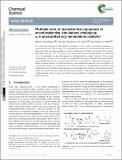Multiple roles of aryloxide leaving groups in enantioselective annulations employing α,β-unsaturated acyl ammonium catalysis
Abstract
An isothiourea-catalysed Michael addition-annulation process using β-fluoroalkyl-substituted α,β-unsaturated aryl esters and a range of 2-acylbenzazoles is reported for the enantioselective synthesis of dihydropyranone and dihydropyridinone products bearing polyfluorinated stereocentres (29 examples, up to 98% yield, > 99:1 er). The choice of aryl group of the aryl ester proved essential in determining reaction enantioselectivity and dihydropyranone:dihydropyridinone product selectivity. The aryloxide leaving group is shown to play a number of essential additional roles, operating (i) as a Brønsted base, circumventing the need for an auxiliary base; and (ii) as a Lewis base to catalyse the isomerisation of dihydropyranone products into thermodynamically-favoured dihydropyridinones. After optimisation, this isomerisation process was exploited for the selective synthesis of dihydropyridinone products using acylbenzothiazoles, and either dihydropyranone or dihydropyridinone products using acylbenzoxazoles. Finally, the phenol derivative, produced following protonation of the aryloxide, is proposed to act as a Brønsted acid, which promotes an isothiourea-catalysed kinetic resolution of benzoxazole-derived dihydropyranones.
Citation
Greenhalgh , M , Qu , S , Slawin , A & Smith , A D 2018 , ' Multiple roles of aryloxide leaving groups in enantioselective annulations employing α,β-unsaturated acyl ammonium catalysis ' , Chemical Science , vol. 9 , no. 21 , pp. 4909-4918 . https://doi.org/10.1039/C8SC01324A
Publication
Chemical Science
Status
Peer reviewed
ISSN
2041-6520Type
Journal article
Description
The research leading to these results has received funding from the ERC under the European Union’s Seventh Framework Programme (FP7/2007--2013)/E.R.C. grant agreement 279850. A.D.S. thanks the Royal Society for a Wolfson Research Merit Award.Collections
Items in the St Andrews Research Repository are protected by copyright, with all rights reserved, unless otherwise indicated.

